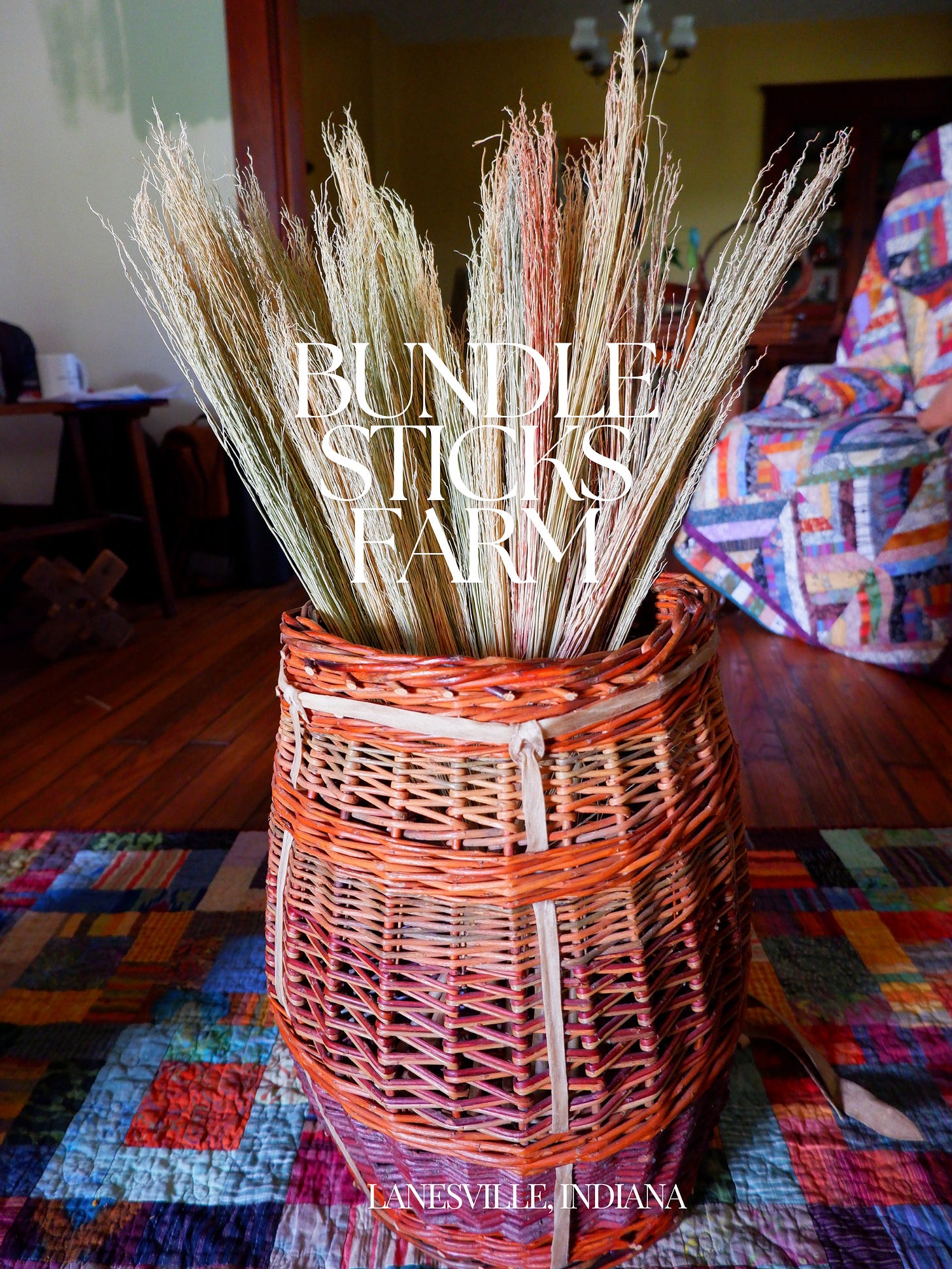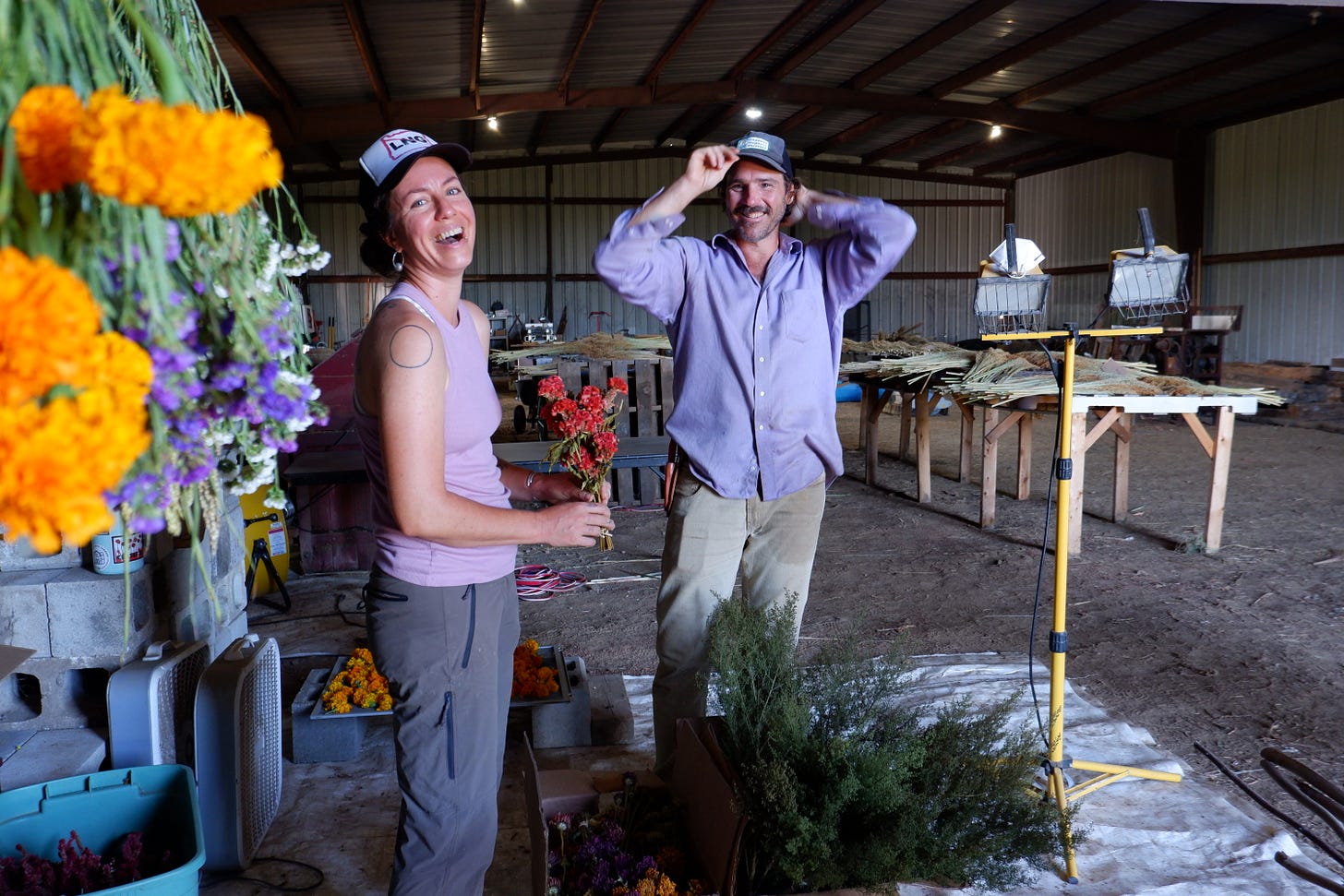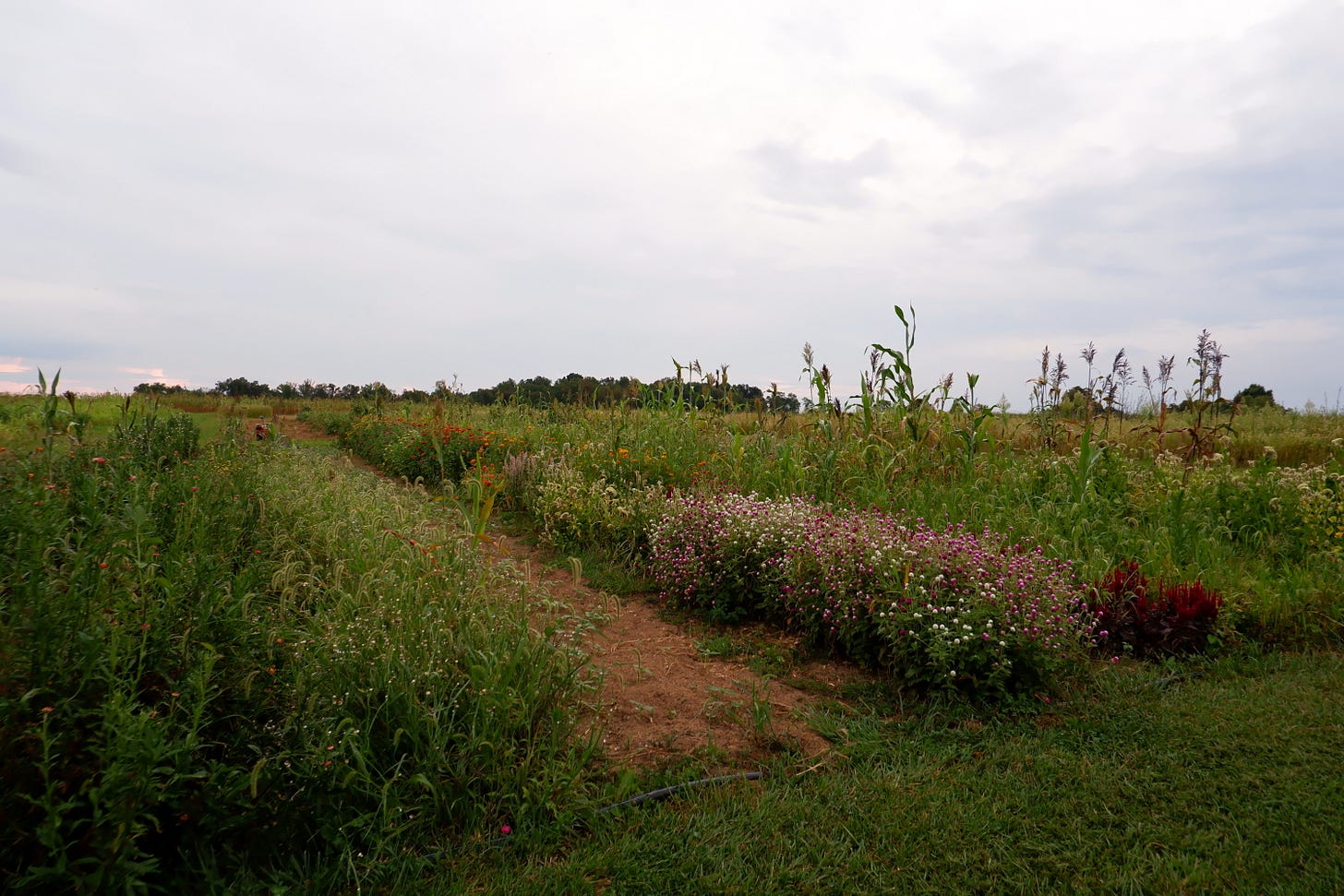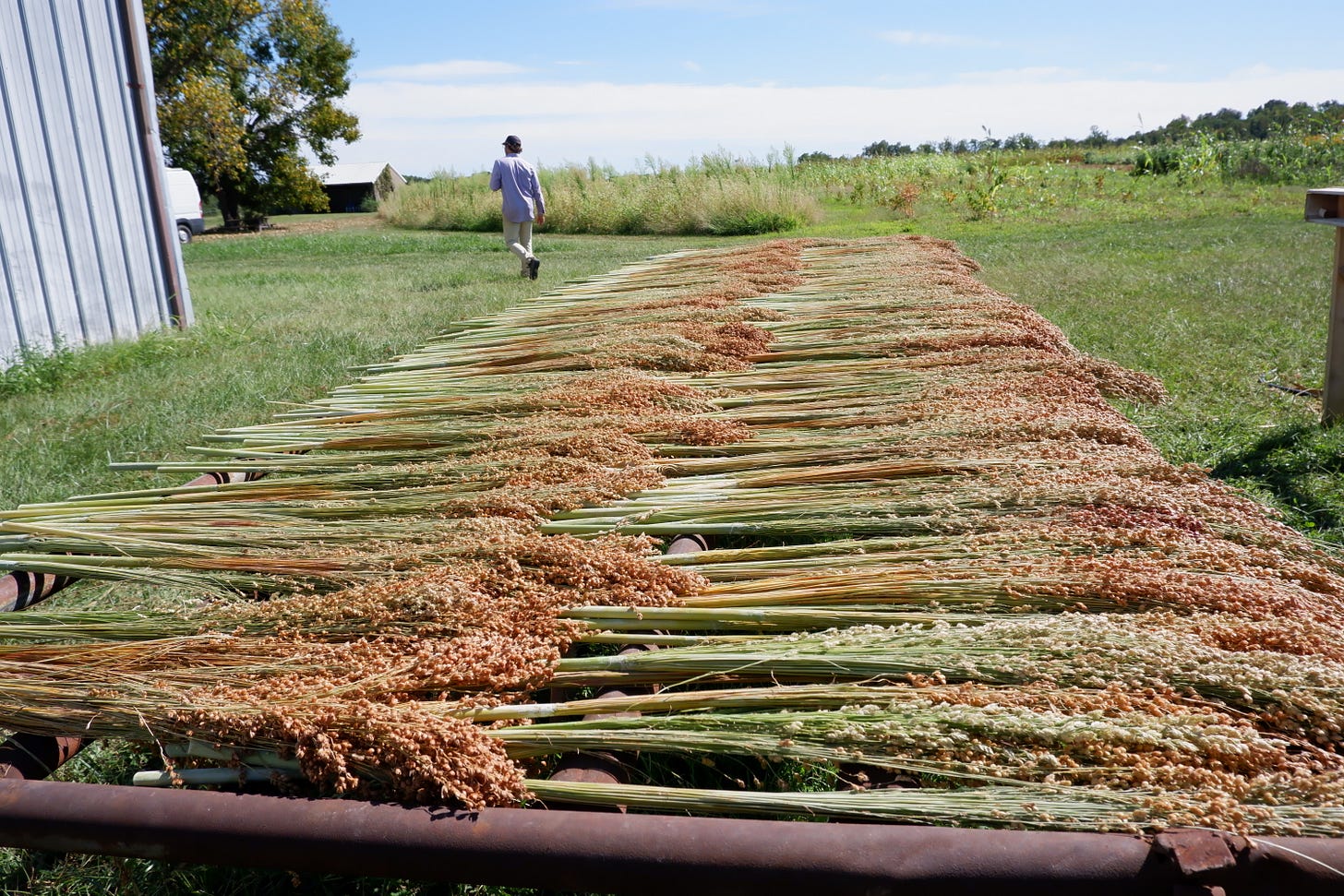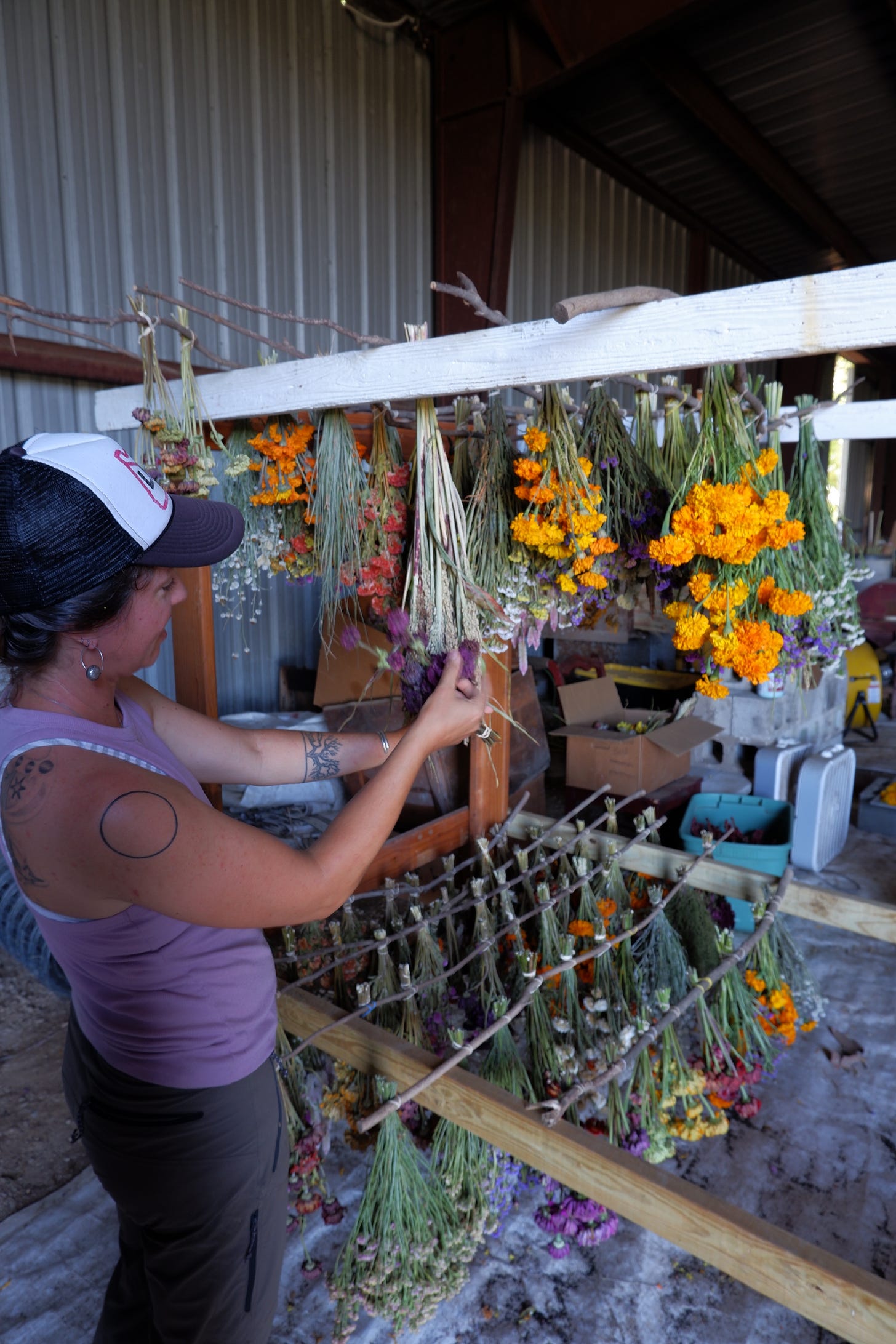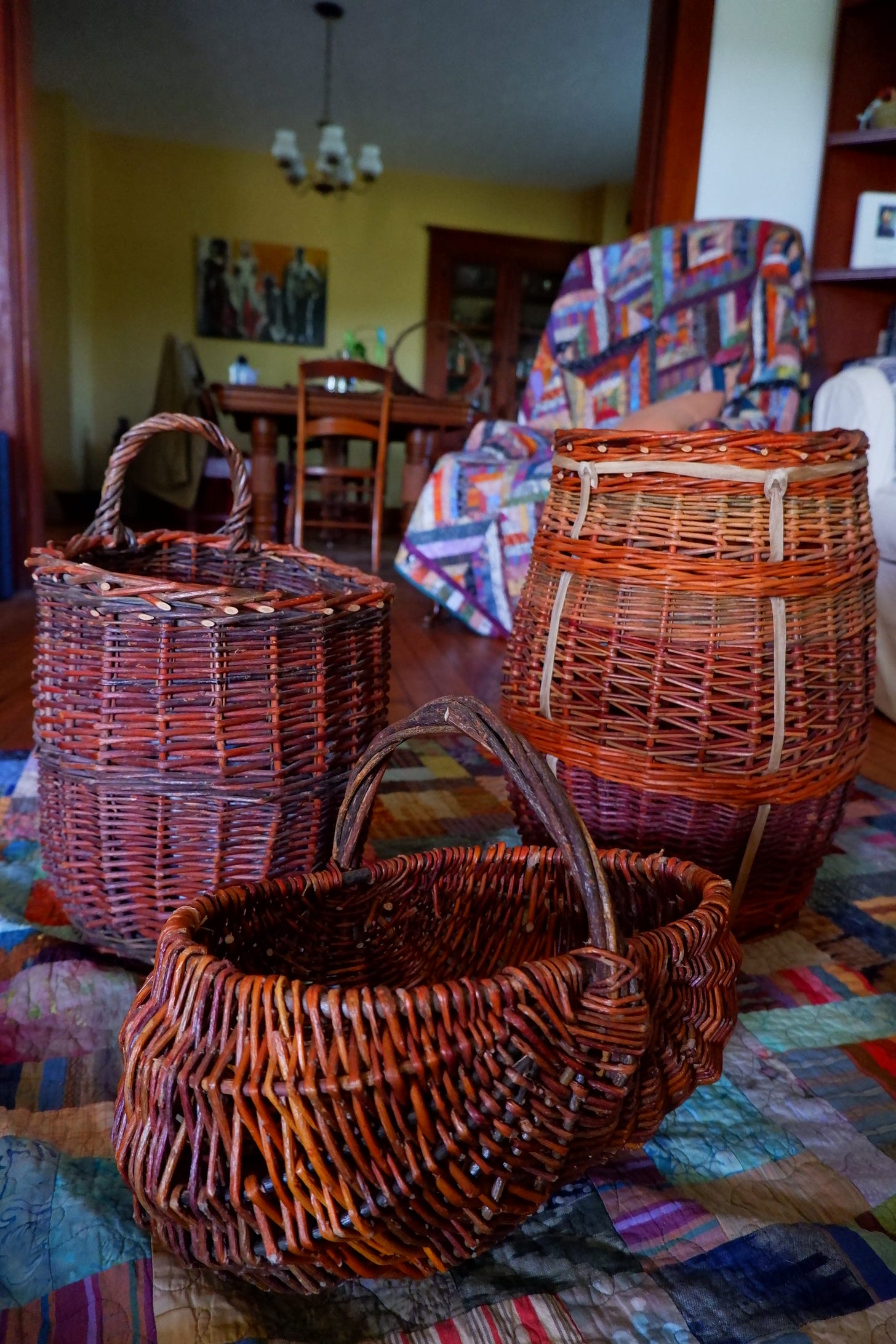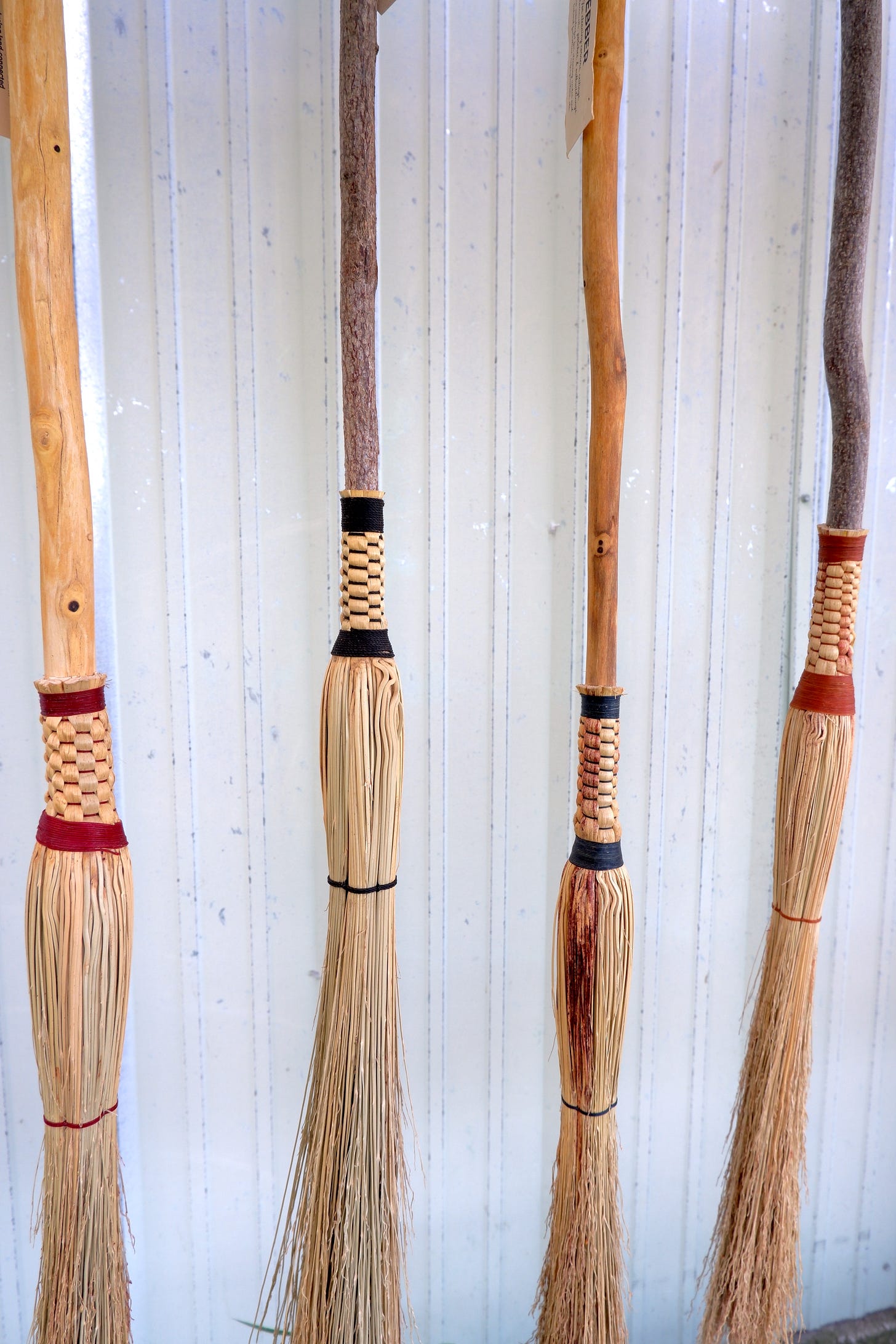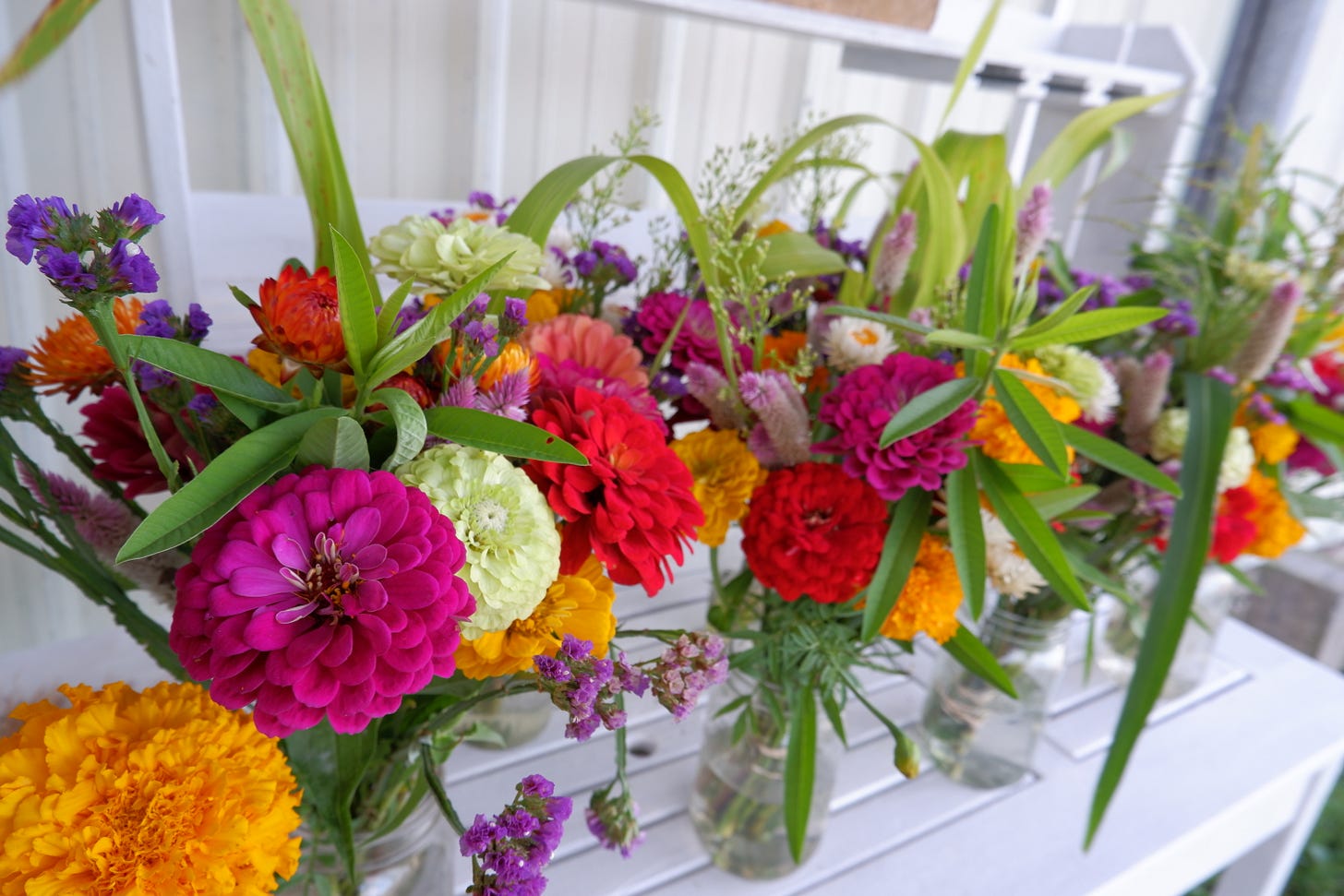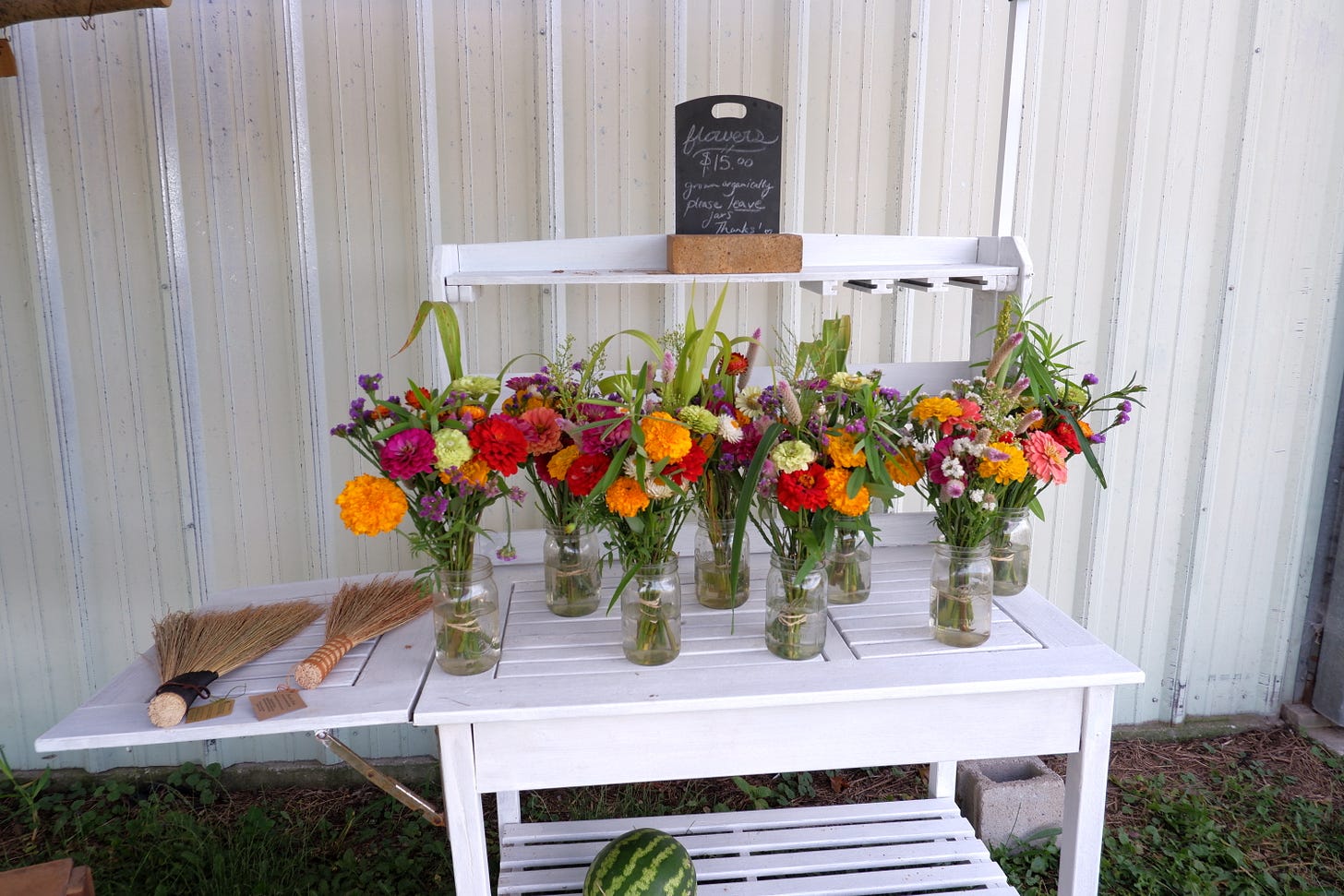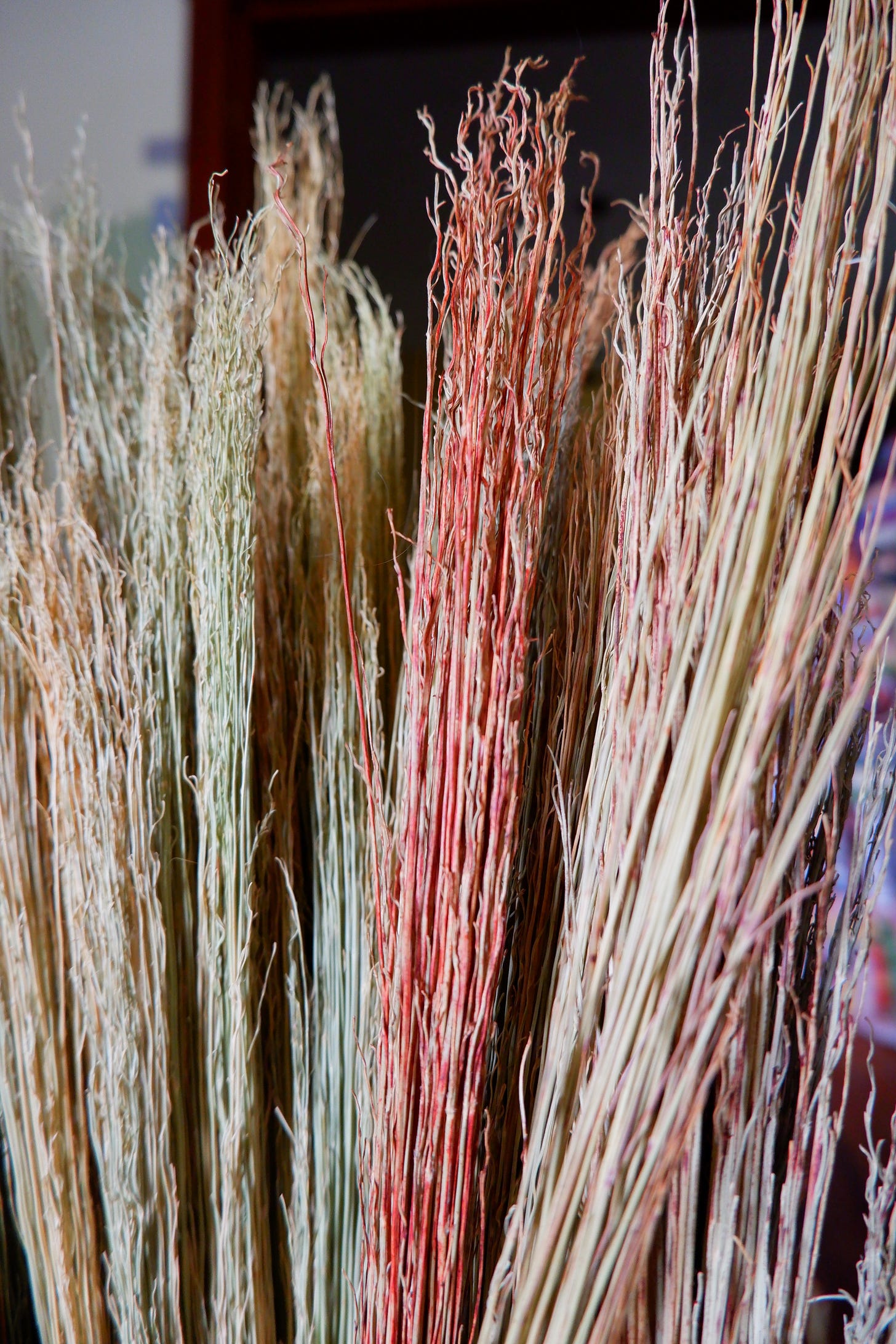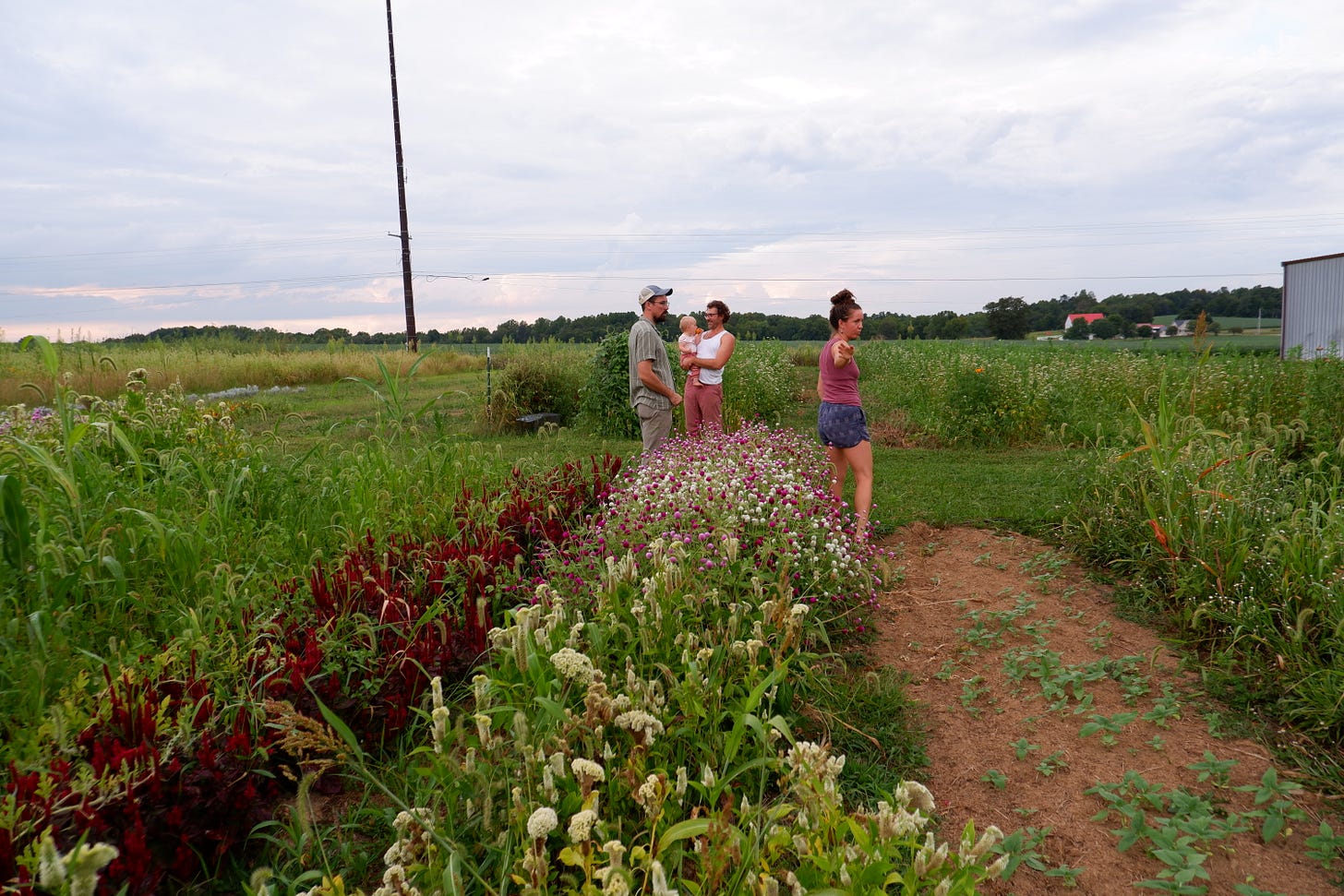The Beginnings of Bundle Sticks
A Glimpse into the World of Craft Farmers and the Return of the Bobwhite
We sit on the porch after night has fallen, the consensus being that broom making would be easier after our toddler had gone to bed, our hands free. Elizabeth stands nearby, making her wreaths of neglected grape vines and dried flowers. Brian comments as we begin, “We started farming broom corn before I even knew how to make a broom. We got the seed and planted two acres of it. And luckily, I really do enjoy the practice of making a broom and learning to craft, but it's new to me. I would say that I really like making brooms and that's just a stroke of luck.” He laughs heartily. We spend the next hour spinning twine around crackling broom corn stalks, weaving the thread in a simple yet beautiful pattern. Graham and I are thrilled, left energized by our “cobwebbers,” and Brian comments that we’ve “caught the broom bug.” Once finished we sweep up the remains of our project and knock down the cobwebs in the corners of the porch with joy.
Brian and Elizabeth are the co-founders of Bundle Sticks Farm in Lanesville, Indiana. A stone’s throw from Louisville, Kentucky and the majestic Ohio River, they came to steward this 55-acre plot after looking for land in 2022. It was here their vision was born: a land-based, community-focused craft farm.
A craft farm. A craft farm? My late teens and twenties were spent working on a variety of small-scale organic farms. After many years in this world, I had gained the impression that I had seen most types of sustainable agriculture: a diverse array of vegetables, berries, micro-creameries, orchards, cut flowers, hemp, seed production, livestock for meat, herbs for medicine and more. Upon hearing the vision of farming Brian and Elizabeth held, I realized I was missing one facet that touches the lives of people every day: growing materials for art and function. Baskets, brooms, fiber, and flowers: farming focused on crops useful to the human outside of digestion.
Bundle Sticks is no ordinary farm. And these are no ordinary farmers.
Elizabeth Tobey comes from a long lineage of artists and craftspeople, and is easily one of the most extraordinary women I know. After spending much of her life nestled between the Cascades and Pacific, her talent and heart is broad as it is deep. You can begin to understand her best while sitting inside their Lanesville home, throughout which artifacts from her ancestors fill the nooks and walls: her great-grandfather’s painting–the acclaimed David Park–hangs in the dining room, while nearby an antique hutch is filled with her grandma’s handmade pottery in a delightful array of shapes and colors. On the couches and beds lie her mother’s truly dazzling quilts, and in the corner are stacked willow baskets made by Elizabeth herself. She possesses the same talent and interest in the arts as her family before her, sharing stories of her past as a dancer, her stints in theater, and her experience with fiber arts. Combined with a deep knowledge of sustainable agriculture and homesteading skills, starting a craft farm makes perfect sense for the shape her life has taken. Elizabeth has truly dedicated herself to the pursuit of learning, and in tandem with a great spirit of sharing, she has been molded into a talented teacher, deeply needed in our modern times.
And that is just one half of Bundle Sticks. Raised in Indiana himself, Brian Geier formerly owned and operated a homemade sauerkraut business aptly named “Sour Power.” He sold fermented goods at a Louisville, KY farmers market before transplanting to southwestern Oregon where our paths first crossed. While there, Brian headed the education programs run by White Oak, a non-profit farm and education center. For many years he led field trips, preschool, and summer camps, all the while assisting the farm crew, milking the goats, pruning fruit trees, and doing endless hours of weed-wacking. I was lucky enough to land a job at White Oak in 2017, my first full-time farming gig after college, and my time there was the most formative experience of my young life. I had the pleasure of living and working alongside Brian, teaching children about nature, acorns, skinks, pinecones, composting toilets, and other such enthralling subjects. The communal fridge was always burping with his homemade kraut, yogurt, and “spicy carrots,” and you could often find him leaned over the dehydrator while processing fruit, or next to the wood stove, cracking acorns to make flour. He, like Elizabeth, is a truly gifted educator, blessed with abundant patience, kindness, and humor.

So here we are, late summer of 2024, my family’s second visit to Bundle Sticks, their 1900s farmhouse slightly less decked out from top to bottom in pink floral wallpaper than our first visit. From a birds-eye view, you’d no longer see just your typical midwestern row crops. Now there are rows of basketry willow growing in an array of colors, bordered by flower gardens and native prairie plantings that host a paradise of songbirds and butterflies. Just past the newly planted windbreak of native hardwoods, pines, elderberries and cedars, broom corn stretches in long rows. You might also see Brian harvesting heirloom watermelon for the roadside farm stand, while Elizabeth, billhook in hand, whittles hazel sticks into garden stakes.
When asked about the decision to focus on growing craft materials, the Bundle Sticks farmers put it simply: the basket is the beginning of the food system. Humans have always needed a basket in order to harvest and store food. When explaining their farming ideas to the local old timers, there is an understanding that is often lost on younger ears. In years past, rural folks would harvest and craft much of their everyday tools, food, and clothing from the land in which they lived. Younger generations have acclimated to our online shopping and one-day shipping from far away places. Much of our tools and clothes are now made out of various forms of plastic. Bundle Sticks shifts the human story back to one where we grow plants and animals for our families and local communities as the best means to provide for our needs.
There is such a richness in this mindset shift: that when we care for the land, in return the land kindly cares for us. I have witnessed the beauty of this in my own life, and it is why I am so inspired by the vision of Bundle Sticks Farm. When we have a relationship with the ordinary things of our life–we know the willow our basket is woven from, harvest the broom materials that sweep up our kitchen messes, and our art is made by hand and not by Hobby Lobby–our lives become evermore infused with meaning. Not only do these objects hold practical use, but they sing with the memory of planting, tending, harvesting and creating, and that memory vibrates with a joy that fills the whole home. Thus, Bundle Sticks.
In tandem with the farm, Brian and Elizabeth have also just begun a nonprofit: Farm Craft Connect. They hope to connect the public to their land, and to teach crafts from the bounty of materials they’re growing. Already they’ve hosted White Oak-style field trips for school groups, and led a delightful spread of workshops this fall in broom making, wreath-weaving, natural dye-ing, and eco-printing. All of these took place at their farm, allowing participants to connect more deeply with the plants being used and the land on which they’re grown. Future workshops hold truly a unique and exciting opportunity for visitors to deepen their relationship with the Earth, and hone traditional skills that are in danger of being lost.
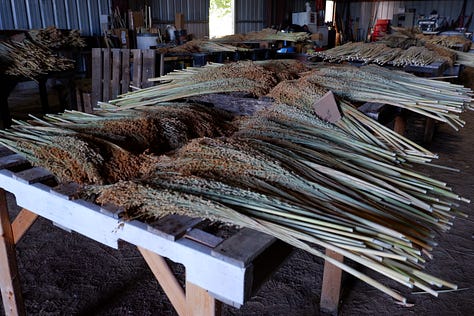
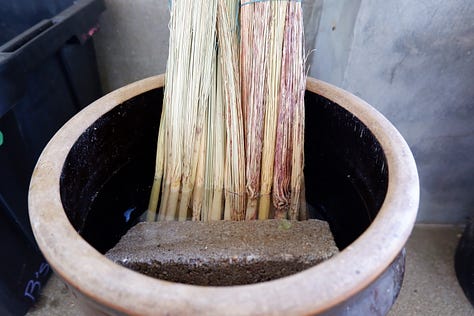

On our last morning at Bundle Sticks, I take our one year old daughter for a walk around the property. There is such an abundance of buzzing all around us, mating monarchs and meaty dragonflies dancing in the rows of rainbow zinnias and marigolds, the call of the bobwhite quail punctuating the moment with his song. Recently, a neighbor stopped by and enthusiastically shared that he had seen a flock of the quails scurrying around Bundle Stick’s newly planted native hedgerows, and that he hadn’t seen any around in a quarter century or more.
We are in a precious moment in our planet’s story where projects like Bundle Sticks are needed more than ever. People are hungry to connect deeper with the Earth, and the Earth in turn cries out to be better cared for. Skills like broom making or basket weaving are in danger of atrophying from our collective human memory without the hearts of people like Brian and Elizabeth. May this be a testament to the power of two people whose work is already bringing about so much good. We are beyond blessed by this project, that our daughter can munch on heirloom watermelon to the sound of quail calls, that bobwhites and brooms are a part of the world she’s growing up in. For this, I am beyond grateful.
—---------------------------
“Bundle Sticks Farm is a land-connected craft farm, dedicated to producing high quality craft materials and products while building biodiversity and nurturing community and the land. It is also home to Farm Craft Connect, our educational nonprofit, which offers land-connected craft, natural farming and land stewardship workshops on the farm and in our surrounding communities. We look forward to crafting with you soon. Learn more at www.bundlesticksfarm.org or follow us @bundlesticksfarm”



